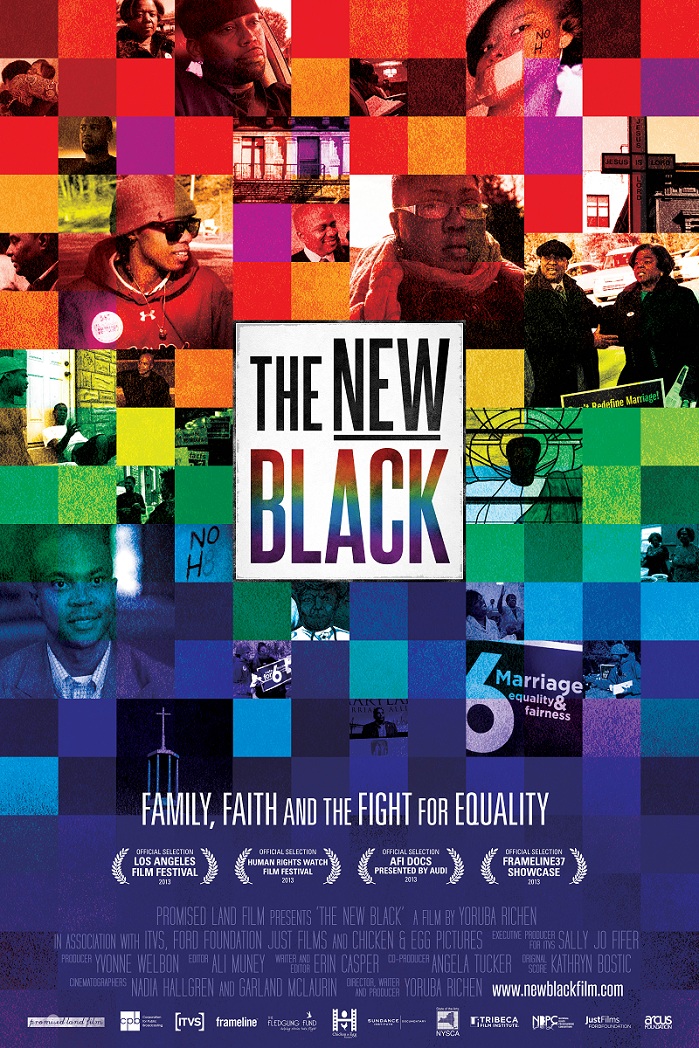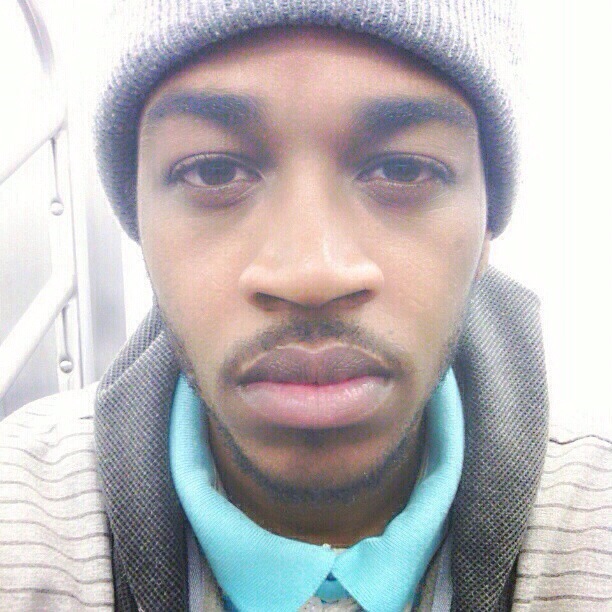
There’s a really special scene in Yoruba Richen’s documentary “The New Black,” where heterosexual black LGBT activist/organizer Sharon Lettman-Hicks gets into a disagreement with a female family member about homosexuality at a get- together with her in-laws. The woman states that “God did not make lesbians,” while Sharon questions her. Earlier, in that same house, an older black aunt shares that when her granddaughter “came out,” she told her she would always love her no matter “which way she goes.”
It’s these kinds of sharp, varied interactions that make the film particularly resonant. Where mainstream media has aimed to present the black community as a monolith of homophobia and sinful preachers, Richen does the opposite, allowing for all sides to have a stake in the issue.
Director, Yoruba Richen
I appreciate these scenes because I’ve seen them before- in my own family, at a barbecue, amongst my friends. Folks may get heated, but most importantly, they are heard. Through an engrossing series of interviews, and candid day-to-day footage with young LGBT field workers, clergy on both sides of the gay marriage debate, community members, and black men sitting on a Baltimore stoop, Richen carefully tracks the growing momentum leading up to the Maryland gay marriage referendum in 2012, which passed by a 52.4% vote, and marked the first time marriage rights were granted to same-sex couples by popular vote, many of them African American.
I talked with Richen over the phone about her motivations for making the film, the easy, yet problematic associations between blackness and homophobia, and what the film means to her on a personal level. “The New Black” starts streaming on Netflix today, and is also available on many other platforms like DVD and through several VOD outlets, via Promised Land Films.
Shadow & Act: Can you talk a little bit about what brought you to this documentary?
Yoruba Richen: I came up with the idea for this film because of what happened the night of 2008 whenBarack Obama was elected president andProposition 8 passed, which outlawed the recently won right for gays and lesbians in the state of California to marry. It was quite an interesting night to have the election of the first black president, and then this big defeat for gay marriage, and especially for those of us in the black and LGBT communities.
What happened next was really shocking in that they started blaming African Americans for its loss, and this narrative took hold about homophobia in the black community, and that it was somehow more intense than in other communities, and there was a question of gay rights versus civil rights becoming the media’s narrative.
I wanted to find out why this was happening, why these two groups were being pitted against each other and what that was about, and of course within that, black LGBT voices were not heard from in that debate at all. I started to follow characters who were working on bridging the gap between these communities, who were working on how to move forward now that gay rights have sort of bubbled up to the national political scene, and eventually the film became about how the African American community, and the particularly the black church, was grappling with this issue, and the Maryland storyline, even a couple years after I started filming, brought together all these different pieces I looking at.
S&A: Awesome, and can you talk about the title of the film, “The New Black,” and how it fits within an ongoing debate that equates gay rights with civil rights, especially for African American people, and where you stand on that with the title of the film.
YR: I chose the title because of its provocative nature. It came from this article in The Advocate Magazine that said “Is Gay The New Black?” and it really pissed off a lot of people. For me, the title actually means the new conversation that is happening in our communities around issues of homosexuality. The new black are really the activists that I profile who are working within the black community around this issue, to fight for the rights of LGBT folk, and of black LGBT folks in our community. To me, that’s the new black.
S&A: I actually wanted to ask about one of those activists. When I saw the film, I noticed that the audience especially responded to Karess Taylor-Hughes and how her personal struggles with her family were handled alongside the film’s narrative. How did she become involved with the film and what is she doing now?
Karess Taylor-Hughes
YR: The Maryland storyline really didn’t come to the forefront until two and a half years after I started filming. I started to follow it because it brought together these different pieces I was looking at, and Karess is one of the lead field organizers in that campaign in Maryland. I got connected with her, and started filming the work she was doing. She’s an amazing woman and she had dedicated her life for the last couple years to this issue, she had worked on the North Carolina campaign which was defeated, and then started working for the Maryland campaign, and she was obviously totally charismatic and funny and smart.
She was also dealing with the personal ramifications of her work and how her family feels about her sexuality so she just embodies the personal being political. Now, she continues to do amazingly, and she’s at Columbia University in a Master’s Program studying Sports Management.
S&A: That’s so great to hear. I mean, I felt a connection to many of the characters in the film, but her story was very personal and intimate.
I also wonder, because you have some really balanced interviews and perspectives, how were you able to get someone like Pastor McCoy involved with the project, and were there any obstacles to getting him in the film?
YR: I’m very grateful that he agreed for me to tell his story and show that side. He was the face of the anti-gay marriage campaign in Maryland so I think he wanted to do it- they were trying to win too, so they wanted to get out what they were trying to do.
Part of my job as a filmmaker is getting people to do things they don’t want to do, and you have to be persistent. I had to be persistent, I had to also let him know that I wasn’t trying to demonize the other side and I wasn’t trying to make fun of that side, and I wanted to tell both sides of the story, and he agreed and was able to let me in.
S&A: I feel his perspective was given a fair treatment in the film. There’s a great quote in your film that says, “All of a sudden, it was black versus gay.” I wanted you to talk about that- what do you think is behind this conflation or association between blackness and homophobia and what kind of stake does American media have in perpetuating it?
YR: First of all, if you look at what happened in California, after Proposition 8 was passed, there was an erroneous poll that came out, that said that black people voted for it by 70% and that turned out later to be false, and that narrative- people still believe it today, and I have tell people, no those aren’t the numbers. Black people did vote in majority for it, but in the same numbers as other groups.
I also think that the storyline is good because what we tend to do a lot of times in this country is pit groups against each other, so we’re all fighting for the same piece of the pie and it’s like, it becomes a zero sum game. If one group advances then another group is perceived not to advance or they perceive themselves not to advance, and because of our history as African Americans, this idea that another group is going to advance and it’s going to be at the expense of us, is definitely a viewpoint in the community.
I also think there has been a strain of homophobia in our church, as in other churches as well, and sometimes the media listens to the loudest voice in the room. More recently, the film tries to show, the black church figures have spoken in support of gay marriage. I think having the NAACP come out and president Obama come out, as well as what happened in Maryland for marriage equality, shows the voice of supporting gay rights is starting to become louder, whereas it wasn’t necessarily before.
If you look at where America is, African Americans are right alongside everyone else. There’s been an evolution amongst everyone on this, and not just African Americans. So, we’re no different really than other communities that are grappling with this, and it’s our younger people that are changing minds, that have a completely different view about this, and that’s the same in all demographics.
S&A: Even when I look within my family, I see an array of perspectives about the issue, so I appreciate how the documentary goes into different ways of thinking. Also, there’s this theme in the film with the black family and how gay marriage is seen alongside the black family, and how the black family has been in a contested space coming out of slavery. Can you talk about that?
YR: I think that even though we mirror a lot of what’s going on around the country around this issue, we too have a particular history in terms of how we’ve been allowed to have families. We’re probably the only group beside gay people, who haven’t been allowed, and have been kept from having a family and it was illegal for us to get married to each other and for many years, to anybody who was white because of miscegenation laws. So we’ve been very regulated when it comes to our families and how we’ve been able to have families.
I think that within that, and I had one of my interviewees say this actually, you know there’s this race to be normal because our families have been so pathologized that anything that comes and is not quote on quote normal, we’re resistant to, or reject because of our history of always being made to be abnormal, unequal and pathologized.
You know, a lot of LGBT black folks come out to their families and they’re like, it’s not even about homophobia, it’s like why would you take on another issue when you have to deal with being black? Why would you put yourself through that, by taking on being gay? So, you have to look at our history to understand the diverse opinions around this issue, and the black church has been where we sought refuge, where our basis for our freedom movement began, and still holds that memory so it’s important to understand that as well to understand the influence of the black church in the black community, even if you’re not particularly religious.
S&A: Definitely, and what does this film to you, personally?
YR: I want this film to be a conversation-starter and to be able to help people have conversations around sexuality. Because of being black, being woman, and being gay, I’ve experienced the intersectionality of this, and as a person who is hoping for more freedom and justice for all people, I think it’s important that we understand the intersectionality of race and gender and sexuality, and if the film can be part of that conversation, and eventually promote change, then I would personally feel like its met its mission; the mission I wanted it to have.
***
***
Nijla Mu’min is a writer and filmmaker from the East Bay Area. She is currently in post-production on a short film, “Dream,” and is developing several feature scripts.
Posted from WordPress for Android




Recent Comments